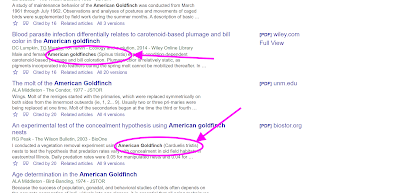
19 Aug Birds, Fish, and a Search Tip for Science Students
Some of you may recall from my posts earlier this year that my family and I have a lot of birds that nest around our house. We put out lots of bird feeders and hanging plants which attract all kinds of birds. Some of our favorites are Orioles and Yellow Finches. Recently, I learned that yellow finch isn’t actually the right name for what we see at our feeders. What we actually see are American Goldfinches whose Latin name is Spinus tristis.
My discovery of the Latin name for the American Goldfinch was prompted by revisiting a passage from Daniel Russell’s The Joy of Search. In the seventeenth chapter of his book Dr. Russell writes about his research of parrotfish. On pages 242 and 243 of his book he explains that used the Latin name for a specific type of parrotfish so that he was sure his search results were about the specific fish he was interested in and not all parrotfish.
I tend to be a slow reader because I often stop to jot notes in my notebook or ponder questions that pop into my mind while reading. One of those questions that popped into my brain while reading pages 242 and 243 of The Joy of Search was, “have I been calling birds by the wrong name?” It turns out that I haven’t been necessarily using the wrong name for our bird feeder visitors, but I haven’t been using the most correct name. That discovery was made through a simple Google search for “yellow finch latin name.”
The tip for science students.
If students are getting mixed results or conflicting search results when researching plants or animals, using the Latin or scientific names for those plants or animals will quickly narrow the scope of their search results. Similarly, using the Latin or scientific names in a search on Google Scholar will lead ften to papers that are hyper-focused on attributes of those plants or animals. Just be careful because that can lead you down another rabbit hole as it did for me when I discovered a second, accepted scientific name for American Goldfinches.
Some of you may recall from my posts earlier this year that my family and I have a lot of birds that nest around our house. We put out lots of bird feeders and hanging plants which attract all kinds of birds. Some of our favorites are Orioles and Yellow Finches. Recently, I learned that yellow finch isn’t actually the right name for what we see at our feeders. What we actually see are American Goldfinches whose Latin name is Spinus tristis. My discovery of the Latin name for the American Goldfinch was prompted by revisiting a passage from Daniel Russell’s The Joy of Search. In the seventeenth chapter of his book Dr. Russell writes about his research of parrotfish. On pages 242 and 243 of his book he explains that used the Latin name for a specific type of parrotfish so that he was sure his search results were about the specific fish he was interested in and not all parrotfish. I tend to be a slow reader because I often stop to jot notes in my notebook or ponder questions that pop into my mind while reading. One of those questions that popped into my brain while reading pages 242 and 243 of The Joy of Search was, “have I been calling birds by the wrong name?” It turns out that I haven’t been necessarily using the wrong name for our bird feeder visitors, but I haven’t been using the most correct name. That discovery was made through a simple Google search for “yellow finch latin name.” The tip for science students. If students are getting mixed results or conflicting search results when researching plants or animals, using the Latin or scientific names for those plants or animals will quickly narrow the scope of their search results. Similarly, using the Latin or scientific names in a search on Google Scholar will lead ften to papers that are hyper-focused on attributes of those plants or animals. Just be careful because that can lead you down another rabbit hole as it did for me when I discovered a second, accepted scientific name for American Goldfinches. Free Technology For Teachers, Google scholar, how to, search strategies, search tips, The Joy of SearchRead More
Free Technology For Teachers, Google scholar, how to, search strategies, search tips, The Joy of SearchRead More




Sorry, the comment form is closed at this time.